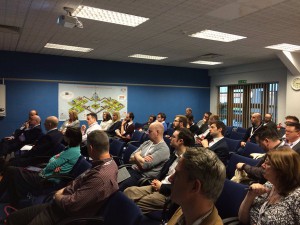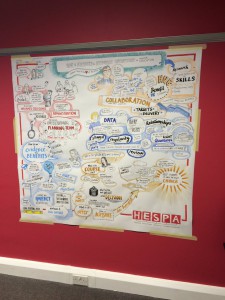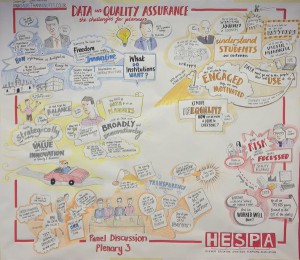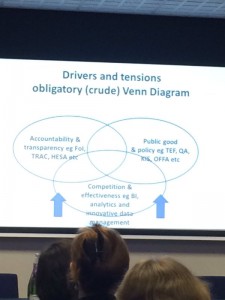Feb 2016 sees me back at my third HESPA conference. I wasn’t going to do a live blog this year. I decided to Tweet a few of my conference highlights (hey – is easier and less long winded). You can pick up the entire stream by searching #HESPA16.
But as often happens, colleagues asked me for an email summary and it seems such a shame to go to the effort of collating that and not publish for others to view. So it’s a mercifully short blog this year from me!
We’re back to Loughborough – I studied my Masters degree here back in 96 and had a 10 year career at the University so it’s hello to an old friend from me.
The first of these HESPA conferences I came to was as a guest, to get a feel for the community, issues and opportunities. At the second I spoke with HESA and Jisc colleagues to put across a vision for a shared national business intelligence service for UK Higher Education. Feb 2016 and I’m back with Giles Carden and Jackie Njoroge (HESPA Exec project co-designers), Jonathan Waller (HESA Director of data and analysis) outlining the Heidi Plus service (launched Nov 15) available to all 180 publicly funded Higher Education providers, related organisations and departments. While I spoke with Gary Tindell (UEL) and Richard Elliot (Northumberland Uni) about Heidi Lab – a Jisc led initiative attempting to provide insights into Higher Ed business problems through; 9 teams of 50 planners from 40 universities, a secure technical environment for data processing, an emerging data catalogue describing the data sources used, how to link them and what insights are available and the 24 Feb showcase event where HESA, Jisc and HESPA will begin to shortlist outputs (dashboards) for service production (via Heidi Plus or Jisc beta service.
And no one fell asleep!
Some nice feedback here from an attendee; Hi Myles, hopefully catch you later but just wanted to say how great it was to see Gary and Richard talking so passionately about Heidi Lab. It was my first time hearing the direct feedback from the participants and it gave me a real insight into what can be achieved – its no longer just theoretical. You’ve all done a great job :o)
Tweets;
HESPA graphic recordings
Victoria Lowry Head of policy NUS; What metrics are meaningful to students when choosing Universities
Other delegates discussed withdrawal of careers service provision in schools and emerging chasm – we have begun to address some of this in Heidi Lab and could link to related work such as http://www.lmiforall.org.uk
HESPA are developing a CPD offer (seeking accreditation) which may match up with Jisc digital capability / leadership in summer 16 along with a handbook – we might collaborate to this Higher education strategy and planning – a practical guide
Chris Hale of UUK stepped in for David Willetts and mentioned our Jisc and HESA Heidi Plus and Heidi Lab work as examples of good stuff going on to address the data in HE issues planners and the sector are facing.
A common thread this year was the need for openness, transparency, new data driven services and tensions of collection burden, legal requirements and importantly alignment with institutional requirements. What’s in it for us? The promised benefits must be addressed early in order that we drive the changes such issues seem to require.
Last session of the day was Paul Clarke (CEO HESA) talking up the need for data exploitation, marketisation, public trust and confidence. Helping the University sector to play a far wider role in society than it has. All building up to the HESA data futures programme (results of the public consultation here https://www.hesa.ac.uk/df_consultation) Barriers – Victorian plumbing; lack of integration of data, inefficiency in data collection, processing and dissemination, duplicated data, variable data quality. Enter the HESA Data Futures Programme. 117 responses, 64% rate, 91.4% supportive of overall direction of travel. Two responses were negative, so I had dinner with 0.8% of responds last night!
Paul mentioned co-design with stakeholders but no methodology – code sign is something we at Jisc have been kicking around and refining for a couple of years now. Also mentioned vendor negotiation. Again, something Jisc has been kicking around, most recently last week with our Learning analytics service development. We’re aware of overlap; I joined Paul Clarke (CEO HESA), Paul Feldman (CEO Jisc), John de Pury (UUK assistant director of policy) and other colleagues a fortnight ago to discuss new collaborative opportunities to help align our capacity for the data driven benefit of the sector. Other aspects that are not part of the DF programme but are supportive of it;
More integrated data, more efficient data flows (more APIs, fewer bulk transfers), streamlined data specifications, agreed canonical sources of core information, more flexibility in data returns, less resource intensive, systems and processes designed around users.
Al HESA data is cloud stored so a turn around there and an aim to make all HESA data open and publicly available from their web site (though presumably not were DPA bound!)
Who could argue with that – interested to see what audience response we see….
Qualitative data required as well as quantitative – Yes HESA recognise importance, but while important data is not the only contributor.
So another excellent HESPA conference. Some brilliant talks, conversations, nice venue, good food and a great bunch of people – the UK HE planning community to be working with!





